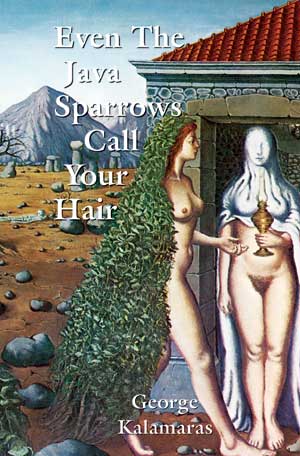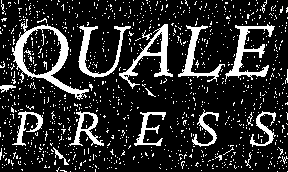|
|
 |
|
Even the Java Sparrows Call Your Hair
by George Kalamaras
ISBN: 0-9744503-2-4
Perfect Bound, $14.00
Publication Date: December 15, 2004.
5.25 x 8 inches, 108 pages
PROSE POETRY
Individuals: Order directly from Asterism Books,
or Amazon.com.
Bookstores: Order through Asterism Books.
|
|
|
Even the Java Sparrows Call Your Hair is a bright book amidst dark times. Witness a young woman birthing a perfectly oval egg or learn the ropes of the Wang Wei Board Game, taking on the role of a lute or a panda chewing bamboo. Kalamaras’s electric poems move delicately between Eastern mystic thought, surrealism, and meditations on the human body and soul. They suggest that the body’s true spiritual worth can be discovered in its connectivity with the universe, alighting a pony on the tongue or an ascending angel out of the spine: His quieter musings work not so much as to question, but to point out a direction of understanding: “When you pull the earth apart to plant iris bulbs, what is that purple bending at the back of your throat? What bird sings in the Chinese elm with your vocal chords and the step of your weight that leaves traces of threatening sky on pointed leaves?”
The December 15th release of Even the Java Sparrows Call Your Hair “accidentally” marks the 80th anniversary of the publication of André Breton’s First Manifesto of Surrealism. Even the Java Sparrows draws heavily upon Kalamaras’s embrace of modern international poetry in translation, particularly that of the Spanish, Greek, French, and Japanese Surrealists who inhabit the groundwork of his vision, conversing at times with several of his heroes — Cesar Vallejo, Miguel Hernandez, Yannis Ritsos, and Takahashi Shinkichi, among others. The prose poems range from dealing with his parents’ divorce when he was a child and his deepening understanding of his Greek ancestry, to 1960s guitar heroes the likes of Jimi Hendrix, George Harrison, and John Cipollina, to his interest in ancient Chinese poetry blossoming forth in his invention of a “Wang Wei Board Game.” Kalamaras uses language as the primary vehicle of spiritual and emotive transformation — a language deeply rooted in the practice of meditation and the insights of a reciprocal vision of the interanimation of all things.
“The name Kalamaras means, as everyone knows, He Who Channels the Throat Songs of the Inflamed Detectives of Southern Surreality. He has more language at his command than Peter Mark Roget, but though we recognize the words, their electrifying combinations have never been heard before. Given Kalamaras’s impressively penetrating knowledge of English literature, and his pendant for Asian poetry, Tantric Buddhist texts, and twentieth century contemporary international poetry in translation, the delicious eclecticism of the poems and the velocity of their outrageously wide range of reference should be no surprise. But the alarming fact is: they are as surprising as they are addictive. Kalamaras is a prolific exploratory formalist in a class with Robert Burton. Even the Java Sparrows Call Your Hair is an inexhaustible jolt of caffeinated joy.”
—Forrest Gander
In “Wang Wei Board Game,” George Kalamaras devises a game based on the I Ching, the poems and lives of Meng Chiao, Tu Fu, and Li Po, moths, sexual desire, and contemporary fears and dreams. Like all games, it is fiction, both a narrative and a maze in which the reader becomes the writer, and (contrary to some theorists) the writer becomes the reader. Like the massive boulders floating in a Magritte painting, Kalamaras’ poems are dense and airy. They pull us into a world that is as haunting as the dream we can never quite remember. There are poems for George Harrison and Laura Nyro. The poet cites non-existent books one realizes should exist, as well as paintings none of us have seen. The footnotes of one poem reveal the secret stories running through any word that is used. Even the Java Sparrows Call Your Hair calls to us with the music of sirens and saxophones. It glows in the darkness of the post-apocalyptic imagination.
—John Yau
|
|
|
From Even the Java Sparrows Call Your Hair...
If
If the moon suddenly broke water in your left eardrum, would it feel like a halo widening into a sphere of Saturn, bending your head, your entire weighty sunflower, to the left? If the men come and give you a casket, place you in it face down in paisley tie, will you regard the silk from your past differently, that black stocking of your wife more like dusk or a hurricane approaching you from below? Do you wish for it over and over until the olive tree itself splinters and walks down to the river and Miguel Hernández is there waiting for you with the affectionate knives? Do you lean against the dishwasher and fantasize about a tomcat humping cabbage leaves just before it dies from the concussion thud of a sparrow that suddenly collapses against its head? Do you tap your skull at midnight and hear the bones of your face strain to expand rigid fingers? A drop of leopard milk oozing from the tip of your penis? The moon in the throat of an owl ruffle and lift toward something hollow? The day may be calm, the afternoon fierce, the evening quiet. If afternoon starlight spun invisible and crackled like fire, would you ask the neighbor girl at the lemonade stand for a nickel? A toy truck? A pink plastic jump rope to tie your hands together at your groin in prayer? The guy down the block selling Bibles for a piece of leather on which to bite? A prayer card with a blond Jesus and the loving memory date on which you were born and on which you first tasted the forgery of a fig? When you pull the earth apart to plant iris bulbs, what is that purple burning the bend at the back of your throat? What bird sings in the Chinese elm with your vocal cords and the step of your weight that leaves traces of threatening sky on pointed leaves?
|
© Quale Press LLC, 2006. Receive information on Quale Press books.
Terms for Booksellers.
|
|
|
